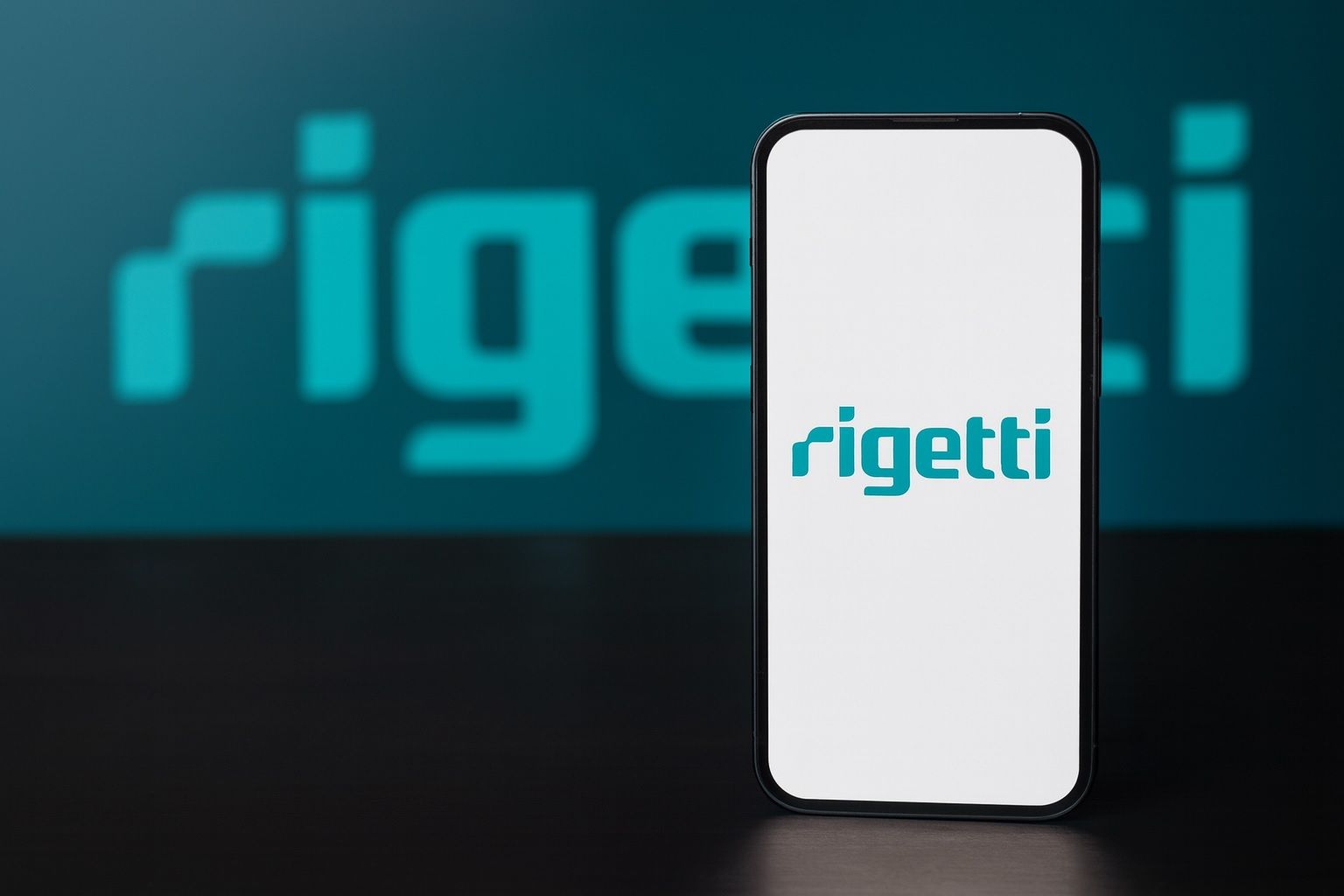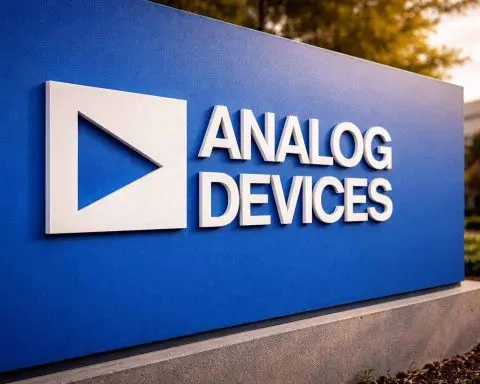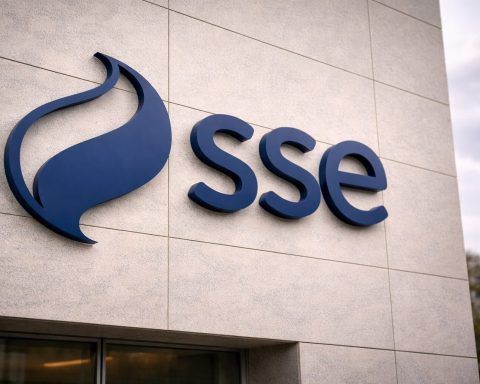- Record Surge: Rigetti Computing (NASDAQ: RGTI) stock hit an all-time high of around $56 per share this week after spiking 25% in a single day on Oct. 13ts2.tech. Shares have skyrocketed over 5,000% in the past year, transforming the once-penny stock into a multi-billion dollar high-flyerts2.techfastcompany.com.
- Volatile Pullback: After its mid-week peak, RGTI slid sharply – plunging nearly 15% on Thursday, Oct. 16, and dipping further in early Friday tradingfastcompany.comfastcompany.com. The stock settled in the mid-$40s by week’s end amid broader market jitters and profit-taking, though it remains up astronomically year-over-year. Rigetti’s 52-week range now spans from under $1 to about $58ts2.tech, underscoring extreme volatility.
- Deals Fueling Hype: Investor excitement is underpinned by Rigetti’s recent quantum computing wins. In late September, the company secured a $5.8 million U.S. Air Force contract (with partner QphoX) to develop quantum networks, and announced $5.7 million in new orders for its Novera quantum computersts2.tech. It also launched a cutting-edge 36-qubit processor available via the cloud – concrete milestones that have driven the stock’s rapid ascentts2.tech.
- Sky-High Valuation vs. Tiny Sales: Despite a market cap near $17 billion, Rigetti’s annual revenue is only on the order of $8–10 million, and the company remains deeply unprofitablets2.tech. The stock now trades at an eye-popping 1,500×+ its sales – an almost unprecedented multiplets2.tech. This disconnect between valuation and fundamentals has raised bubble concerns on Wall Street.
- Analysts Bullish but Cautious: Every Wall Street analyst covering Rigetti rates it a “Buy”, reflecting optimism about its long-term potential. However, their average 12-month price targets sit in the $20s, roughly 50% below RGTI’s recent trading levelsts2.tech. Analysts praise Rigetti’s technology but warn the quantum computing stock boom may be unsustainable, predicting a potential pullback as reality catches up with hypets2.tech.
Stock Soars to Record High, Then Sees Wild Swings
Rigetti’s stock price has been on a breathtaking run in 2025, riding a wave of enthusiasm for quantum computing. At the start of the year, RGTI shares traded for under $1. By mid-October, the stock had rocketed into the mid-$50sts2.tech. It closed at a record $56.34 on October 15, 2025ts2.tech – marking an almost 50-fold increase from a year ago. In just the past week, Rigetti exploded from the mid-$40s to new highs, including a ~25% surge in a single day (Oct. 13)ts2.tech. This frenetic rally has lifted Rigetti’s market capitalization into the $16–18 billion rangets2.tech, an astounding figure given the company’s minimal revenues.
For context, the exuberance isn’t isolated to Rigetti. Other pure-play quantum computing stocks have also skyrocketed this year – IonQ is up roughly 700% year-over-year, and D-Wave has surged over 2,000%ts2.tech. Investors have been piling into the sector’s promise, driving a speculative “quantum boom.”
However, this quantum euphoria showed cracks by the end of the week. On Thursday, October 16, Rigetti’s stock abruptly plunged ~15% intraday, falling from the $50s down into the high-$40sfastcompany.com. All of the “Quantum Four” companies (Rigetti, IonQ, Quantum Computing Inc., and D-Wave) saw double-digit percentage drops that dayfastcompany.comfastcompany.com. RGTI then dipped further in pre-market trading Friday (at one point down another ~7–8%) before stabilizing around the mid-$40sfastcompany.comfastcompany.com. Even after this pullback, Rigetti is still up about 5,000% from a year agofastcompany.com – a stunning gain that highlights both the thrill and risk of its run. The stock’s 52-week range now spans roughly $0.80 to $58.15ts2.tech, reflecting an extreme trajectory of boom and bust swings in a short period.
What’s behind the sudden stumble? In this case, there was no negative development specific to Rigetti’s business last week. Instead, the slide came amid broader market turbulence and likely some healthy profit-taking by early investors. On Thursday, a scare in the banking sector (a regional bank disclosed a fraud-related loss) spooked the overall marketfastcompany.com. High-flying tech stocks, especially speculative names like Rigetti, were hit hard as traders rushed to lock in gains. Analysts note that after such a parabolic rise, it’s natural for investors to “gravitate toward safe-haven” assets or take some money off the table when any bad news emergesfastcompany.comfastcompany.com. In Rigetti’s case, reports also surfaced that CEO Subodh Kulkarni had quietly sold 1,000,000 shares (his entire stake) earlier in the yearts2.tech. News of insider selling, combined with the stock’s overbought technical signals, gave traders another reason to hit the brakests2.techts2.tech. In short, after an unbelievable climb, RGTI got a reality check: even quantum-fueled rockets don’t go up in a straight line forever.
Big Deals, Contracts & Tech Breakthroughs Drive Optimism
The fundamental story behind Rigetti’s surge is a series of notable deals and technological milestones that signaled real progress in its quest to build cutting-edge quantum computers. While Rigetti is still a pre-revenue company in many respects, recent announcements have lent tangible credibility to its ambitions – and helped ignite investor excitement.
Contract Wins: In late September, Rigetti announced two significant contract awards that sent its stock soaring even higher. First, the company, in collaboration with Dutch startup QphoX, won a $5.8 million contract from the U.S. Air Force Research Lab (AFRL) to advance quantum computing for defense applicationsts2.tech. The three-year project will focus on developing superconducting quantum networks, an endorsement of Rigetti’s technology by a major government customer. Around the same time, Rigetti also revealed it secured $5.7 million in purchase orders for two of its new “Novera” on-premises quantum computersts2.tech. The buyers weren’t named (one is an Asian manufacturing company and the other a U.S. AI startup, according to reports)businessinsider.com, but these represent Rigetti’s first commercial system sales. For a company that recorded only about $10.8 million in total revenue last year, landing over $5 million in orders from real customers – including the U.S. government – is a huge validation. Each deal is on the order of 70–80% of Rigetti’s annual sales and showed that paying clients are willing to invest in Rigetti’s quantum techts2.tech. Not surprisingly, RGTI stock jumped 11–19% on the news of these winsts2.tech. “It’s actually investors reacting to real purchase orders,” commented Thomas Hulick of Strategy Asset Managers, noting that while $5.7 million is modest revenue, the psychological impact on market sentiment was far greaterbusinessinsider.combusinessinsider.com.
Technology Milestones: Rigetti has also made rapid strides on the R&D front. In August 2025, the company unveiled its latest quantum processor, dubbed “Cepheus-1”, a 36-qubit quantum processing unit built with a novel multi-chip architecture. Essentially, Rigetti connected four of its superconducting chips to work together as one – a major leap from its previous 9-qubit single-chip devicests2.tech. This new design dramatically boosts Rigetti’s computing power and reliability: the two-qubit gate fidelity (a key measure of quantum error rates) reached ~99.5%, cutting error rates roughly in half compared to Rigetti’s prior systemts2.tech. “Quadrupling our chiplet count and significantly decreasing error rates is the clear path towards quantum advantage and fault tolerance,” emphasized Rigetti CEO Subodh Kulkarni in a statement, underscoring the significance of this breakthroughts2.tech. The Cepheus-1 36Q system was made generally available on Rigetti’s Quantum Cloud Services platform in Q3, and it’s also being offered through Microsoft’s Azure Quantum cloud marketplacets2.tech. Rigetti even expects to launch a 100+ qubit system by the end of 2025, aiming to maintain these high fidelity levelstipranks.com. Such technical progress suggests Rigetti is steadily pushing the frontier of quantum computing – a key reason investors have been bidding up the stock.
Partnerships and Expansion: Alongside deals and tech upgrades, Rigetti has been forging partnerships to bolster its ecosystem and global reach. Notably, Taiwan’s Quanta Computer – a major electronics manufacturer – made a $35 million strategic investment in Rigetti this year as part of a broader collaboration (worth over $100 million) to help Rigetti scale up production of its quantum hardwarets2.tech. This tie-up should aid Rigetti in eventually manufacturing quantum processors at larger volumes. The company also inked a memorandum of understanding with India’s Centre for Development of Advanced Computing (C-DAC) in September to co-develop hybrid quantum-classical computing initiativests2.tech, potentially opening the door to the fast-growing Indian tech market. Closer to home, Rigetti delivered its first on-premises Novera™ quantum computer (a 9-qubit system) to Montana State University in Augustts2.tech. That deployment – for an academic research lab – marked the first time Rigetti has sold a quantum computer directly to a customer for on-site use, a milestone showing the company’s transition from lab prototype to real-world product. Additionally, Rigetti announced a partnership with NVIDIA to integrate its quantum computing platform with NVIDIA’s GPUs and software toolsts2.tech. By combining quantum and classical computing resources, this collaboration aims to accelerate performance and practical applications for Rigetti’s systems. All of these moves – from government contracts and university installations to alliances with industry giants – signal that Rigetti is building credibility and an ecosystem around its technology. They show that Rigetti isn’t just a science project; it’s starting to gain footholds in the market, which in turn has fed the market’s bullish narrative for the stock.
Wall Street Forecasts: Optimism with Big Caveats
Despite the recent heroics of RGTI’s share price, professional analysts covering Rigetti are walking a fine line between enthusiasm for the technology and caution about the stock’s valuation. All known analysts have a bullish rating on Rigetti – essentially everyone says “Buy” or equivalent – citing the company’s leadership in a potentially revolutionary industry. For example, brokerage firm Benchmark Capital praised Rigetti’s rapid technical progress and on October 7 raised its price target to $50 (with a Buy rating)ts2.tech. Around the same time, B. Riley Securities hiked its target from $19 to $35 as Rigetti’s prospects improvedbusinessinsider.com. Firms like Needham and Cantor Fitzgerald have also reiterated bullish ratings. However, many of these same analysts acknowledge that Rigetti’s stock has run far ahead of fundamentals. Most price targets remain far below the current price – often in the teens or low-$20s – reflecting a belief that a lot of future success is already “baked in.” The consensus 12-month target for RGTI is only in the mid-$20sts2.tech. Even Benchmark’s aggressive $50 target essentially suggests the stock is fully valued already (Rigetti has been trading in the $50+ range). In fact, MarketBeat reports an average analyst target around $28, implying significant downside from recent levelsts2.tech. In other words, Wall Street might love Rigetti’s long-term potential, but by the numbers, they generally think the stock should be much lower than where it trades today.
This disconnect highlights how analysts are viewing Rigetti: great company, pricey stock. As one analyst candidly noted, Rigetti’s current ~$10+ billion market cap is built on “tremendous growth assumptions,” while “the shift to commercial quantum… hasn’t happened yet” in any meaningful wayts2.tech. Essentially, investors are pricing in a future where Rigetti achieves major technical breakthroughs and revenue growth that, so far, remain aspirations. Analysts stress that Rigetti will have to execute flawlessly on its roadmap – for instance, delivering that 100+ qubit system by year-end 2025 as promised – and prove that quantum computers can solve real-world problems better than classical computers before the lofty valuation can be justifiedts2.tech. In the meantime, many experts anticipate that RGTI’s stock could “plateau or pull back” in the near term after its huge run-upts2.tech. Morgan Stanley’s tech analyst Joseph Moore recently warned that Rigetti (and its peer IonQ) could fall by up to ~60% if investor sentiment toward the frothy quantum computing sector sours or if any disappointing news arisests2.techts2.tech. It’s not that analysts doubt Rigetti’s promise – far from it. Their uniformly positive ratings show they don’t want clients to miss out on what could be a transformative winner. But their cautious price targets indicate they also foresee a reality check: either a significant correction, or a long period of sideways trading, while the company’s fundamentals catch up to the hypets2.tech. In short, Wall Street’s message is “we like the company, but the stock may have run too far, too fast.”
Quantum Computing Boom or Bubble? Experts Weigh In
Rigetti’s astonishing rise has put it at the center of a broader debate: Is this the dawn of a new tech revolution, or are we witnessing a speculative bubble? The answer, according to market experts, may be a bit of both. On one hand, quantum computing is widely seen as a potentially transformative technology – one that could eventually solve complex problems far beyond the reach of today’s classical computers. A Bank of America strategist recently called the race for quantum supremacy “the most important technological race of our generation,” underscoring why so many investors don’t want to miss out on the next big thingts2.tech. Bulls point to forecasts like a McKinsey study that projects the quantum computing market could grow explosively from about $1 billion today to $70+ billion by 2035ts2.tech. If that kind of growth materializes, early leaders like Rigetti – which operates its own quantum chip fabrication facility and offers a full-stack quantum platform – could eventually justify their hefty valuations. Even some early skeptics have been swayed by the momentum: CNBC’s outspoken market commentator Jim Cramer, who initially derided Rigetti, recently acknowledged that “quantum computing is for real” and that Rigetti “could have something that’s a home run” if its technology advances as hopedts2.techts2.tech. However, Cramer also issued a clear warning, calling Rigetti “pure speculation” at this stage – “I don’t know whether [the company] is worth what it’s trading at,” he admitted, emphasizing that investors must remember it’s still a high-risk betts2.tech. This encapsulates the mixed sentiment: there is tremendous excitement about the future of quantum computing, but also a recognition that current prices may be far ahead of reality.
Indeed, many financial veterans see signs of a classic bubble forming. In an analysis titled “Quantum computing stocks are sinking today,” Fast Company noted that the sector had surged “enormous runs” despite generating very little revenue, and cautioned that with the market turning, some investors are wisely taking profits while they canfastcompany.comfastcompany.com. The respected investment publication Barron’s observed that a basket of quantum stocks had shot up nearly 4× in a year “even though they generate relatively little revenue,” warning this “bubble may keep inflating until it is tested by fundamentals”ts2.tech. In other words, hype can carry these stocks only so far before concrete results are demanded. Morgan Stanley’s Joseph Moore (as mentioned) has gone so far as to predict a steep fall for names like Rigetti if the rosy sentiment cracksts2.tech. Skeptics also point to insider selling as a red flag: along with Rigetti’s CEO selling his stake, several board directors reportedly unloaded millions of dollars worth of shares during the stock’s epic risets2.tech. The lack of insider ownership going forward makes some question management’s true confidence – after all, if the people closest to the company are cashing out at these prices, what does that signal? Famed investor Jeremy Grantham, known for calling market bubbles, has commented generally that in the exponential phase of new technologies, markets often underestimate the challenges and overshoot on price – a caution that certainly seems relevant to quantum computing, where huge technical hurdles (like error correction and scalability) still loom before it can revolutionize everyday computing.
Yet, it’s not all doom and gloom. Plenty of experts remain genuinely optimistic about Rigetti’s prospects, provided one’s investing timeline is long enough. Supporters note that Rigetti’s strategy has parallels to that of Palantir in its early days – focusing on big government contracts and partnerships to fund and hone its cutting-edge techts2.tech. By securing defense and research contracts (such as with the U.S. Air Force and federal labs), Rigetti gets reliable funding and validation, which can serve as a springboard for commercial products down the road, much as Palantir turned its DARPA and CIA-backed projects into a platform now used by many enterprises. Additionally, Rigetti’s collaborations with industry giants like Microsoft (Azure Quantum), NVIDIA, and Quanta give it a level of support and credibility most small-cap startups lackts2.tech. These partners could help channel more users and resources to Rigetti’s quantum cloud services and accelerate its development. The broader adoption of quantum computing by mainstream institutions is also underway – just in the last month, banking giant HSBC executed a bond trade using quantum computing, and Vanguard announced a quantum-powered portfolio optimization trial, hinting that even conservative finance firms are testing the waters of this technologybusinessinsider.com. Such developments imply that the momentum in quantum computing is genuine and building. As one investment manager put it, “Valuations are ahead of themselves, but that’s part of investing in the future… The signs of commercial traction are definitely worth monitoring.”businessinsider.com In essence, the bull case is that Rigetti is one of only a handful of pioneers in a field that could revolutionize computing – so owning a piece of it now, though speculative, might yield massive rewards if quantum machines fulfill their promise.
Outlook: High Hopes vs. High Risk
Rigetti Computing’s stock has delivered a stunning ride in 2025, encapsulating both the market’s thrill for a breakthrough technology and the peril of speculative excess. The company’s recent contract wins and technical strides demonstrate very real progress, fueling justifiable optimism that Rigetti is moving closer to making quantum computing practical. At the same time, the disconnect between Rigetti’s tiny revenues and its towering market valuation has never been more extreme, prompting seasoned observers to urge caution. As one finance columnist quipped, this quantum frenzy “may keep inflating until it is tested by fundamentals.”ts2.tech The coming months – including Rigetti’s next earnings report in November and any new partnership or product announcements – will be closely watched for those fundamental signs. Investors will be looking for evidence that the company can begin to grow into its valuation by accelerating revenue (for example, turning those prototype deals into larger, recurring contracts) and continuing to hit technical milestones.
For now, RGTI remains a high-flying “moonshot” stock, one that balances incredible upside potential against equally outsized riskts2.tech. In a realm as cutting-edge as quantum computing, hype and hope tend to arrive far sooner than profits – and Rigetti’s wild 2025 run-up is a vivid reminder of that. The bottom line: Rigetti’s quantum leap has made early investors a fortune and put the company on the map as a leader in a futuristic industry. But whether this is the start of a sustained revolution or a speculative bubble likely depends on Rigetti’s ability to turn sci-fi-like technology into a profitable reality. In the meantime, investors in Rigetti should buckle up – this quantum ride is likely to remain bumpy.
Sources: Fast Companyfastcompany.comfastcompany.com; ts2.tech (TechStock²)ts2.techts2.tech; Business Insiderbusinessinsider.combusinessinsider.com; Rigetti press releases and SEC filings; Bloomberg & Yahoo Finance data; Analyst commentary via TipRanks and Benzingats2.techts2.tech; Industry reports (McKinsey) and media interviews (CNBC).









